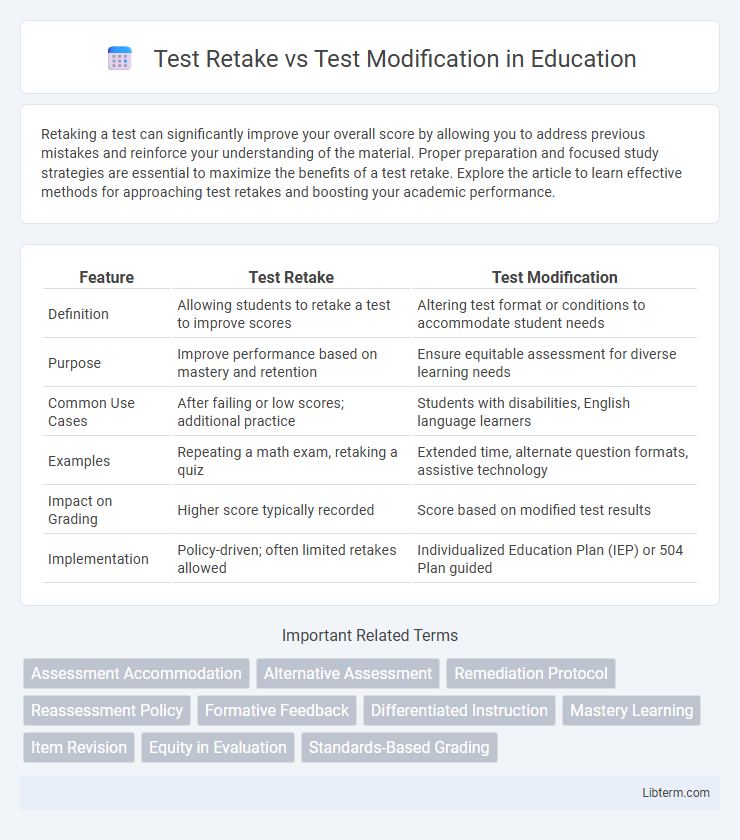Retaking a test can significantly improve your overall score by allowing you to address previous mistakes and reinforce your understanding of the material. Proper preparation and focused study strategies are essential to maximize the benefits of a test retake. Explore the article to learn effective methods for approaching test retakes and boosting your academic performance.
Table of Comparison
| Feature | Test Retake | Test Modification |
|---|---|---|
| Definition | Allowing students to retake a test to improve scores | Altering test format or conditions to accommodate student needs |
| Purpose | Improve performance based on mastery and retention | Ensure equitable assessment for diverse learning needs |
| Common Use Cases | After failing or low scores; additional practice | Students with disabilities, English language learners |
| Examples | Repeating a math exam, retaking a quiz | Extended time, alternate question formats, assistive technology |
| Impact on Grading | Higher score typically recorded | Score based on modified test results |
| Implementation | Policy-driven; often limited retakes allowed | Individualized Education Plan (IEP) or 504 Plan guided |
Understanding Test Retakes
Test retakes allow students to attempt an examination again to improve their scores, typically governed by specific institutional policies and eligibility criteria. Understanding the frequency, timing, and impact of test retakes is crucial for effective academic planning and performance enhancement. Test modifications, by contrast, involve accommodations such as extended time or alternative formats designed to address individual needs without altering test content.
What is Test Modification?
Test modification refers to changes made to the standard testing procedures or materials to accommodate a student's specific needs without altering the content or expectations of the assessment. These adjustments can include extended time, alternative formats, or preferential seating, allowing students with disabilities or learning challenges to demonstrate their knowledge fairly. Test modifications aim to provide equitable testing conditions while maintaining the validity and reliability of the original exam.
Key Differences Between Retake and Modification
Test retake allows students to attempt the same exam again under standard conditions to improve their scores, while test modification involves altering the test format or administration to accommodate individual learning needs or disabilities. Retakes maintain the original test parameters, whereas modifications may include extended time, alternative question formats, or assistive technology. Understanding these key differences ensures appropriate support and fairness in educational assessment policies.
Benefits of Allowing Test Retakes
Allowing test retakes enhances student mastery by providing multiple opportunities to demonstrate knowledge and reduce test anxiety. It promotes continuous learning and skill improvement, leading to higher overall academic performance and retention rates. Offering test retakes also encourages a growth mindset, motivating students to engage more deeply with the material.
Advantages of Test Modification
Test modification offers customized adjustments that accommodate individual learning needs, improving accessibility and fairness during assessments. These modifications can include extended time, alternative formats, or adjusted question types, enhancing student performance by reducing anxiety and matching their unique strengths. Unlike test retakes, modifications provide immediate support without the need for repeated testing, streamlining the evaluation process.
Challenges of Test Retakes
Test retakes pose significant challenges including increased stress and anxiety for students, which can negatively impact performance and well-being. Scheduling conflicts and limited test availability often create logistical difficulties that hinder timely completion of assessments. Moreover, repeated exposure to similar questions may lead to memorization rather than genuine skill mastery, reducing the validity of test scores.
Drawbacks of Test Modification
Test modification can lead to inconsistent benchmarking and diminished validity of assessment results, making it challenging to compare outcomes across different test takers. It may also introduce unintended advantages or disadvantages, potentially compromising the fairness of the testing process. Furthermore, extensive modifications could affect the reliability of the test, reducing its overall effectiveness in accurately measuring the intended skills or knowledge.
Student Perspectives: Retakes vs Modifications
Students often view test retakes as opportunities to improve their understanding and demonstrate mastery after initial assessment, providing a chance for academic growth. Test modifications, such as extended time or altered formats, are perceived as necessary accommodations that level the playing field for those with learning differences or disabilities. Both approaches aim to support student success, but retakes emphasize skill improvement while modifications focus on equitable access.
Impact on Learning Outcomes
Test retake policies allow students to improve scores by demonstrating mastery through repeated assessments, reinforcing knowledge retention and boosting confidence. Test modifications, such as extended time or alternative formats, accommodate diverse learning needs without altering assessment rigor, promoting equity and reducing test anxiety. Both approaches can enhance learning outcomes, but retakes emphasize mastery and skill reinforcement, while modifications ensure fair evaluation of student abilities.
Best Practices for Educators
Educators should carefully differentiate between test retake policies and test modifications to address diverse student needs effectively. Implementing clear guidelines for test retakes ensures fairness and encourages mastery learning, while test modifications, such as extended time or alternate formats, support accessibility for students with disabilities. Maintaining ongoing communication with students and reviewing individual learning plans helps tailor assessments that promote equity and academic growth.
Test Retake Infographic

 libterm.com
libterm.com